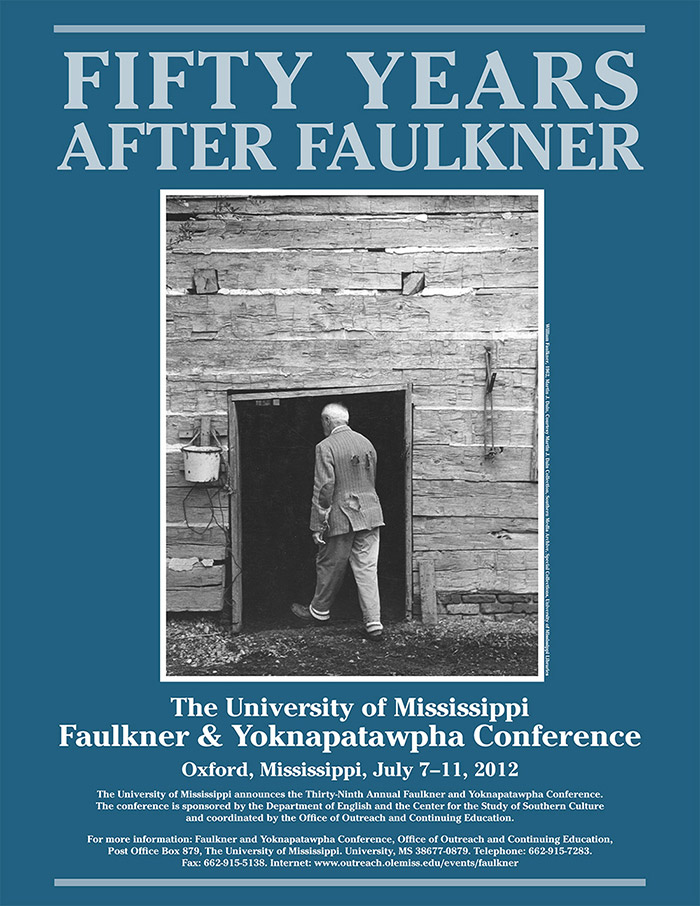
Panel. Faulkner and the Literary Canon
Location
Nutt Auditorium
Start Date
9-7-2012 11:00 AM
Description
- Considering the Unthinkable: The Risks and Rewards of Decanonizing Faulkner / Deborah Clarke, Arizona State University
Are we doing Faulkner any favors by canonizing him? To what extent does our belief in his greatness foreclose different ways of reading his work? Do we default to “if Faulkner did it, it must be brilliant,” giving him the benefit of all doubts? I’ll be looking at how our reverence for his work may actually hinder our understanding of it, as well as alienating students and colleagues who don’t dare to admit their resistance and doubt. Rather than using Faulkner’s difficulty as a way to silence critics, let’s consider what happens if we admit that it may be a problem. It’s time to re-think why Faulkner should—or shouldn’t—retain his position atop the American literary canon. - Popular Faulkner: Pulp Paperbacks, Oprah’s Book Club, and the Curse of the Hypercanonical / Jaime Harker, University of Mississippi
Because of Faulkner’s hypercanonical status—that is, because his writing seems to exemplify the autonomous aesthetic object, placed in opposition to mass culture—decades of brilliant scholarship about Faulkner’s deep and complicated relationship to popular culture have had little effect on the larger direction of Faulkner studies. Building on David Earle’s book Re-Covering Modernism, I suggest that Cold War paperbacks created an egalitarian, diverse reading and writing community that Oprah’s Book Club continued. I conclude by speculating about how a pulp Faulkner canon might construct a new vocabulary for talking about style that articulates multiple interpretive communities and their contingencies of value (in Barbara Herrnstein Smith’s provocative phrase). What happens when we no longer understand popular culture as base source material transformed by genius but as alternate interpretive communities? What if we consider a ‘fertile interchange’ without assuming that our own designations of quality are natural and innate? - Benjy Compson's Mind of the South / Mab Segrest, Connecticut College
Benjy Compson is more than likely the referent of Faulkner's title for The Sound and the Fury. But a reading of the novel through the lens of southern psychiatric history and my own study of Georgia's mammoth and iconic 'lunatic asylum''/sanitarium/state hospital at Milledgeville reveals the complex signification that results from the family's decision to keep a cognitively disabled son and brother out of the state hospital. What do we learn about Faulkner and about the disciplining of "mind" in the Jim Crow South from Faulkner's radical decision to write the novel's opening from Benjy's point of view? How do the Compsons’ choices and those of the African Americans who care for them and for Benjy reverberate through The Sound and the Fury and through other southern works, from To Kill a Mockingbird to The Violent Bear It Away to The Member of the Wedding to Streetcar Named Desire?
Relational Format
Conference proceeding
Recommended Citation
Clarke, Deborah; Harker, Jaime L.; and Segrest, Mab, "Panel. Faulkner and the Literary Canon" (2012). Faulkner and Yoknapatawpha Conference. 17.
https://egrove.olemiss.edu/fy/2012/schedule/17
COinS
Jul 9th, 11:00 AM
Panel. Faulkner and the Literary Canon
Nutt Auditorium
- Considering the Unthinkable: The Risks and Rewards of Decanonizing Faulkner / Deborah Clarke, Arizona State University
Are we doing Faulkner any favors by canonizing him? To what extent does our belief in his greatness foreclose different ways of reading his work? Do we default to “if Faulkner did it, it must be brilliant,” giving him the benefit of all doubts? I’ll be looking at how our reverence for his work may actually hinder our understanding of it, as well as alienating students and colleagues who don’t dare to admit their resistance and doubt. Rather than using Faulkner’s difficulty as a way to silence critics, let’s consider what happens if we admit that it may be a problem. It’s time to re-think why Faulkner should—or shouldn’t—retain his position atop the American literary canon. - Popular Faulkner: Pulp Paperbacks, Oprah’s Book Club, and the Curse of the Hypercanonical / Jaime Harker, University of Mississippi
Because of Faulkner’s hypercanonical status—that is, because his writing seems to exemplify the autonomous aesthetic object, placed in opposition to mass culture—decades of brilliant scholarship about Faulkner’s deep and complicated relationship to popular culture have had little effect on the larger direction of Faulkner studies. Building on David Earle’s book Re-Covering Modernism, I suggest that Cold War paperbacks created an egalitarian, diverse reading and writing community that Oprah’s Book Club continued. I conclude by speculating about how a pulp Faulkner canon might construct a new vocabulary for talking about style that articulates multiple interpretive communities and their contingencies of value (in Barbara Herrnstein Smith’s provocative phrase). What happens when we no longer understand popular culture as base source material transformed by genius but as alternate interpretive communities? What if we consider a ‘fertile interchange’ without assuming that our own designations of quality are natural and innate? - Benjy Compson's Mind of the South / Mab Segrest, Connecticut College
Benjy Compson is more than likely the referent of Faulkner's title for The Sound and the Fury. But a reading of the novel through the lens of southern psychiatric history and my own study of Georgia's mammoth and iconic 'lunatic asylum''/sanitarium/state hospital at Milledgeville reveals the complex signification that results from the family's decision to keep a cognitively disabled son and brother out of the state hospital. What do we learn about Faulkner and about the disciplining of "mind" in the Jim Crow South from Faulkner's radical decision to write the novel's opening from Benjy's point of view? How do the Compsons’ choices and those of the African Americans who care for them and for Benjy reverberate through The Sound and the Fury and through other southern works, from To Kill a Mockingbird to The Violent Bear It Away to The Member of the Wedding to Streetcar Named Desire?

